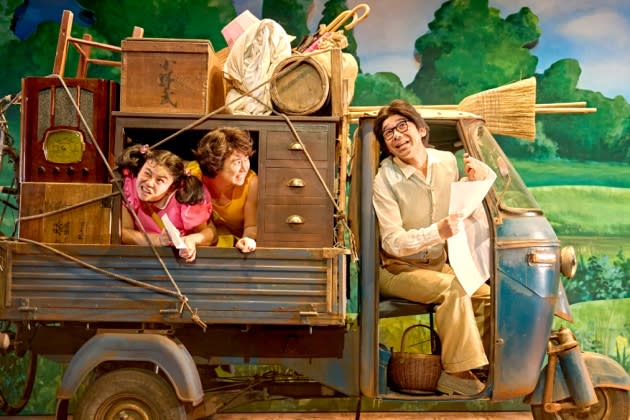‘My Neighbor Totoro’ Review: An Inventive, Visually Thrilling Adaptation of the Studio Ghibli Favorite
- Oops!Something went wrong.Please try again later.
- Oops!Something went wrong.Please try again later.

The Royal Shakespeare Company doesn’t usually sell out an entire run before opening, especially with a new play. But then, it has never had the audacity to stage one of the world’s most beloved animated films, which explains why there are but a handful of tickets left for the 15-week run of this new stage version of Studio Ghibli’s “My Neighbor Totoro.” But adapting so revered an anime title posed a huge risk. Could such utterly filmic material transport a live audience? Happily, with the uniquely inventive director Phelim McDermott at the helm, almost all doubts evaporate.
McDermott, whose eye-watering Philip Glass opera productions — the super-saturated-color “Akhnaten” at English National Opera and the Met and his “Satyagraha” with miles of Scotch tape — made his name co-founding the small, wildly imaginative Improbable Theatre. For anything seemingly unstageable, he’s the go-to guy. Which is probably why he signed on to deliver a story about two young girls and their emotional encounters with ghosts, umpteen animals, multiple locations and the unknowable, giant, forest spirit Totoro who roars but never speaks.
More from Variety
Royal Shakespeare Company Sets Daniel Evans and Tamara Harvey as Co-Artistic Directors
Studio Ghibli Film Catalog Now Available on Digital Rental Platforms
Miyazaki Hayao's 'My Neighbor Totoro' Gets London Stage Adaptation by Royal Shakespeare Company
This production, and McDermott’s work as a whole, is the antithesis of what director Stephen Daldry once termed “burglar’s theater,” in which the lights periodically switch to a blackout and stagehands come on to steal and swap the furniture. This is a theatrical what-you-see-is-what-you-get. You can see the workings.
As with previous puppets-with-passion shows like Marianne Elliott and Tom Morris’ “War Horse,” the puppets and their black-clad handlers, as well as the mechanics of the huge-scale effects, are always visible. But the magic is never sacrificed — arguably, it’s enhanced. That much is evident from the gasps of pleasure from children glued to individual moments and the adults fascinated to clock exactly how they are achieved.
All of this is cunningly prefaced by an opening image of a movie-screen front curtain which, having displayed a nod to the film’s initial credits, then comes comically to life. It then rises on Tom Pye’s painted backcloth and a little truck carrying a family moving to the country, which exactly copies the opening scenes. But having established the characters of the two girls Satsuki (Ami Okumura Jones) and Mei (Mei Mac) and the jolly father (Dai Tabuchi), the literal approach vanishes.
From there on in, all bets are off and the design team let rip with pretty much every type of puppetry, plus giant set pieces, inflatables and more, all marshaled into grand-scale theatrical storytelling. As a feast for the eyes, it’s currently matchless. And that is complimented by leading Japanese composer Joe Hisaishi, who refashions his soundtrack and adds reflective songs (performed by a live singer with a ten-piece band, filled with tuned percussion, perched high above the set.)
Any doubts about the show creep in with the script. The original’s story is exuberant and poignant but its wonders reside in the visual telling, not in the dialogue that young Western audiences know either through dubbing or subtitles. And as with stagings of “Frozen” and other titles near-memorized by children on repeat viewings, a production’s hands are somewhat tied: this is not material that can be taken in a brand new direction. As a result, Tom Morton-Smith’s adaptation is faithful and neat, but anyone coming new to the material in search of satisfying, well-paced plot is likely to be disappointed.
But judging by the long queues for merchandise after the show, it’s clear that fans are more than happy. And given the smile-inducing wonders of theatrical imagination on display, that’s no surprise.
The Royal Shakespeare Company long ago escaped the confines of its name, launching “Nicholas Nickleby” and “Wolf Hall” and “Matilda” into the theatrical world. “My Neighbor Totoro” may not quite match up to the record-breaking potential of its “Les Miserables,” but to quote the bard, it is, without a shadow of a doubt, “a very palpable hit.”
Best of Variety
Sign up for Variety’s Newsletter. For the latest news, follow us on Facebook, Twitter, and Instagram.
